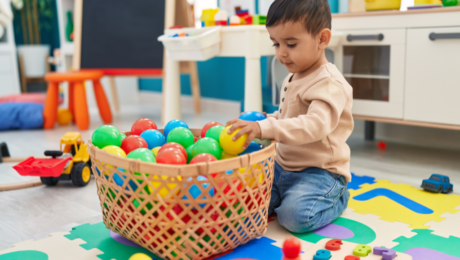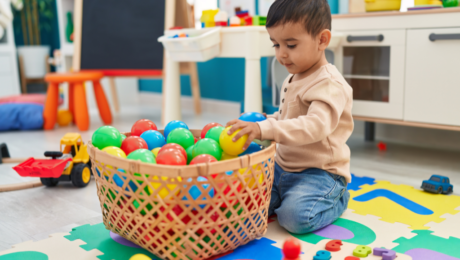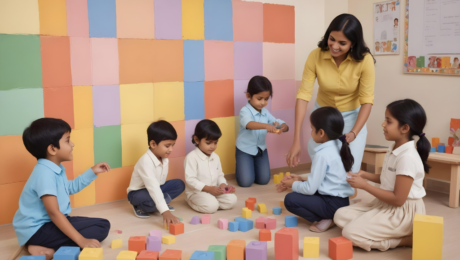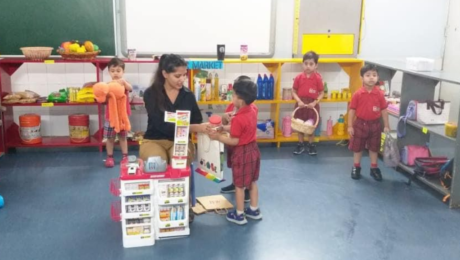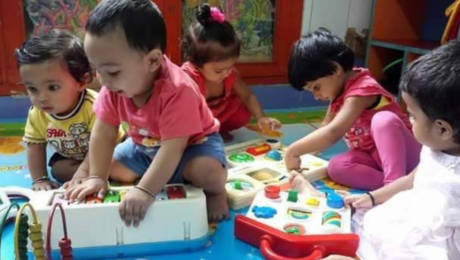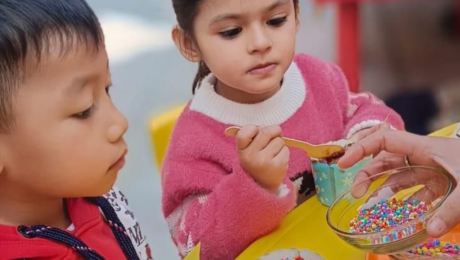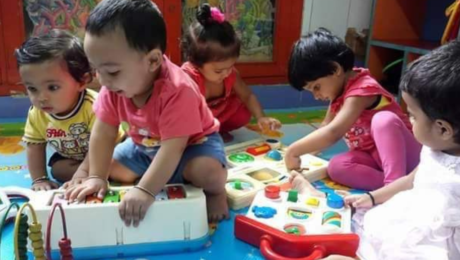Parenting Made Easier: The Joys of Creche Daycare!
If you’ve ever found yourself juggling work commitments, social obligations, and raising your little one, you’re not alone. Let’s face it: the whole ‘work-life balance’ can become overwhelming at times. Thus, we have creche daycare for your rescue. Still don’t know what creche daycare is? Read this article till the end to learn about creche daycares and learn how they can provide a nurturing environment for your child. So let’s get started!
How Creche Daycare Provides a Nurturing Environment?
Here’s how a creche daycare provides a nurturing environment for children:
- Qualified Staff: A creche and daycare have trained caregivers and educators who create a safe and supportive environment for kids. They understand the developmental needs of every child and treat them accordingly.
- Structured Activities: Enrolling in a creche daycare center allows children to follow a daily routine that includes a mix of structured activities, free play, and learning opportunities.
- Emotional Support: Caregivers in a creche foster emotional well-being by providing comfort, encouragement, and positive reinforcement. They help children navigate their feelings and build resilience.
- Safe and Welcoming Environment: Creches are designed to be safe and inviting, with age-appropriate toys, learning materials, and areas for both active play and quiet time.
- Social Interaction: In the creche, children learn to interact with peers, developing social skills like sharing, cooperation, and conflict resolution, all within a guided environment.
- Focus on Individual Needs: Staff often observe and adapt to each child’s unique interests and needs, ensuring that every child feels valued and understood.
Are Creche and Daycare Only Applicable for Working Parents?
Creche daycare isn’t exclusively for working parents, though it is often designed with their needs in mind. Many parents, whether working or not, may choose creches for the following reasons:
- Socialization: Children benefit from interacting with peers, helping them develop social skills.
- Structured Learning: Creches often provide a structured environment that promotes early learning and development.
- Parent Support: Some parents may need time for personal tasks, studies, or self-care, and creches can provide that support.
- Routine Lifestyle: A creche can help a child to establish a routine lifestyle, which can be beneficial for their development.
Ultimately, while creches are popular among working parents, they can also serve a broader range of family needs.
Things to Keep in Mind Before Sending Your Children to a Creche
Before sending your children to a creche, consider the following factors to ensure it’s the right fit for your child:
- Licensing and Accreditation: Check if the creche is licensed and meets local regulations. Accreditation from reputable organizations can also indicate quality.
- Staff Qualifications: Check the caregivers’ qualifications and experience. Professionally trained staff are required for providing a safe and nurturing environment inside the creche.
- Curriculum and Activities: Review the curriculum to ensure it aligns with your child’s developmental needs and includes a balance of play, learning, and socialization.
- Safety Measures: Search for ‘creche daycare near me’ and assess the safety protocols in place, including childproofing, emergency procedures, and staff-to-child ratios.
- Environment: Search for ‘creche and daycare near me’, and visit the facility to observe the space. It should be clean, welcoming, and equipped with age-appropriate toys and materials.
- Parent Communication: Inquire about how the creche communicates with parents. Regular updates and open lines of communication are important for building trust.
- Reviews and Recommendations: Seek feedback from other parents. Personal recommendations and online reviews can provide valuable insights about the reality of the creche.
- Flexibility: Consider the creche’s hours and policies regarding absences, holidays, and emergencies to ensure they fit your family’s schedule.
Taking the time to assess these aspects can help you choose a creche daycare that supports your child’s growth and provides peace of mind for you as a parent.
- Published in Best Play School
From Playtime to Naptime: Finding the Best Baby Daycare Centers Near Me
No wonder why we see so many people asking, “How to find a good baby daycare near me?”. Searching for the best daycare center for your little one is as challenging as finding a needle in a haystack. In this article, we will dive deep into the factors necessary to consider while looking for a baby daycare center. Read this article till the end, as it can rescue you from the struggles of finding the best-suited daycare center for your little one.
Key Factors to Consider While Selecting a Baby Daycare Centre Near Me
Selecting a good daycare centre for your baby is quite challenging, and that is quite evident from the number of queries we receive asking, “How can I find the best daycare for babies near me”. In this segment, let us look at some factors that you must consider when selecting a daycare centre for your baby.
- Licensing and Accreditation: Make sure that the daycare centre is licensed by local or state authorities and it meets regulatory standards. In addition, if a recognized organization accredits the daycare, it gets a brownie point.
- Safety and Cleanliness: Make sure that the daycare center is clean, well-maintained, and secured. Look for childproof measures, safe toys, and a clean environment for your baby. Also, make a note if there are proper health, safety, and emergency protocols within the premises.
- Staff Qualifications: This is another important factor to check. Make sure to verify the qualifications and experience of the staff. They must have relevant experience and qualifications in early childhood education.
- Curriculum and Activities: Review the educational programs and daily activities offered. A good daycare must provide a balanced and structured curriculum, including dedicated time for sleep and play.
- Location and Convenience: Consider the proximity of the daycare to your home or workplace. A conveniently located daycare can make it easy for you to pick up and drop off your baby, reducing traveling time and physical strain.
- Cost and Payment Policies: There are various queries on the internet asking “baby daycare near me prices.” It’s important to understand the fees and payment structure when looking for a daycare for your baby. Compare the cost of all daycares in your area and choose accordingly.
- Health and Nutrition: Make sure to check the food quality and nutritional standards at the daycare if meals or snacks are provided. Make sure to inform them in advance if your baby is allergic to any food item.
Activities For Babies in Daycare Centres
The curriculum and activities for babies at daycare centres are designed in a way to support early childhood education. Here’s a list of activities that are designed at Little Scholar for the little ones:
- Sensory play using textured toys.
- Motor skill development is achieved through activities like tummy time, crawling races, and safe climbing.
- Storytime through reading story books.
- Music and dance are achieved through listening to and singing songs, along with performing simple dance moves.
- Art and craft activities like finger painting or creating collages.
- Social interaction is achieved by interacting with peers and being involved in group activities.
- Outdoor activities like field trips.
- Physical stimulation through simple physical exercises.
- Imaginative play, like pretend kitchen games, helps children in their cognitive development.
- Language activities such as talking to babies and engaging them in conversations can help them enhance their language skills.
As we come to the end of this article, we hope that your queries related to “how to find the best baby daycare centre near me” were addressed. We believe that the pointers mentioned above will make it easier for you to look for a daycare centre for your little one.
- Published in Best Play School
Discover the Top Benefits of Enrolling Your Child in a Day Boarding School in Noida
Are you looking for the perfect institution where academics are blended with extracurricular activities to bring out the true potential of your child? Well, the day boarding school in Noida is here to meet your demands.
A day boarding school is a hybrid model where your child can enjoy the extensive facilities and engaging programs of a full-time boarding school without an overnight stay. In addition to that, day boarding schools also offer various perks. Read this article till the end to know them all.
Benefits of Enrolling Your Child at Day Boarding School in Noida
Enrolling your child in the best day boarding school in Noida has several benefits. Let’s check them out!
- Disciplined Lifestyle: A well-structured educational approach in day boarding school allows students to learn discipline and maintain a balanced routine in life. They also learn to manage their time effectively through this practice.
- Comprehensive Education: Day boarding schools in Noida offer an all-rounder education with proper emphasis on both academics and extracurricular activities. It allows students to discover their potential and identify their true passion. Students also have access to a world-class infrastructure at day boarding schools.
- Extended Learning Time: Extending learning hours at day boarding schools allows them to focus completely on their education and skill enhancement. The best part is students can spend the entire day on academics as well as on extracurricular activities and go home on the same day.
- Social Development: Students coming from various cultural backgrounds in day boarding schools allow students to get exposure to various cultures. Students also participate in group activities and collaborative projects to develop team spirit.
- Parental Involvement: When compared with boarding schools, parents can become more involved in their child’s education when they admit them to a day boarding school.
- Safety and Supervision: The top day boarding school in Noida provides a safe and supervised environment during school hours, which can be reassuring for parents. The extended school hours ensure that children are in a controlled environment rather than spending time alone at home.
- Convenience: For people living in or near Noida, day boarding schools offer the convenience of not having to commute a long distance. Students can benefit from the facilities and programs of a boarding school yet come back home at night.
- Holistic Development: Day boarding schools often focus on the overall development of a child, including physical fitness, creative expression, and emotional well-being. They provide a platform for children to explore their interests and talents in a structured setting.
- Community Building: Attending a day boarding school allows students to build relationships with a diverse group of peers, which can be beneficial for building a community and long-lasting friendships.
Extracurricular Activities in a Day Boarding School in Noida
Apart from academics, day boarding schools in Noida also focus on various extracurricular activities to promote holistic development in children. Here’s a list of all the extracurricular activities done in Little Scholar:
- Sports and physical activities like games and swimming.
- Art and crafts.
- Field trips and excursions.
- Culinary arts.
- Community service and social responsibility.
- Health and wellness like aerobics and martial arts.
With that, we have arrived at the end of this article. In conclusion, it’s safe to say that enrolling your child in a day boarding school in Noida will offer a unique blend of academic rigor, comprehensive extracurricular opportunities, and a balanced lifestyle.
- Published in Best Play School
How Early Childhood Care and Education Pave the Way for Success
In the inspiring words of Nelson Mandela, “Education is the most powerful weapon which you can use to change the world.” Indeed true. He made us believe that we will first have to be the change in order to change the world. And there’s no better way to pave a path for change rather than empowering our future generation. This is exactly where early childhood care and education come into play. It is not just about keeping your children engaged, but it is also about a kick start to their holistic development through play-based education. Come, let’s see why investing in early childhood education is mandatory these days.
Why is Investing in Early Childhood Care and Education Necessary?
Early childhood care and education form the building blocks of a child’s career. In this segment, we will discuss the importance of early childhood care and education and why it’s important to invest in good quality early childhood education:
- Foundation for Future Learning: Early education is the primary reason for brain development in children. A good quality early childhood education helps children to develop a strong foundation for cognitive, social, and emotional skills.
- Improved Academic Outcomes: Children who receive good quality early childhood education are observed to become better in their academic performance in high school. They are seen to score higher on tests, secure better grades, and have a brighter career.
- Social and Emotional Development: Children are made to participate in various activities which stimulate their social and emotional development. At Little Scholar, we organize various outdoor activities and field trips for children to make them interact with various people and enhance their socializing skills.
- Cultural and Social Awareness: All of India’s early childhood care and education systems introduce children to diverse cultures and social norms. It helps children to know about various cultures and get familiar with them. Knowing different cultures also help them in understanding different perspectives.
- Foster Behavioral Skills: Early childhood care and education in India are important because they inject behavioral skills into children. Children develop a behavioral pattern by following a well-planned routine in daycare centers and pre-schools.
- Stimulation of Emotional Development: Early childhood care and education programs in India allow children to be familiar with and understand their emotions. They also learn to express their feelings properly.
- Health and Well-Being: Several early childhood education programs incorporate physical activities, which ensure the physical well-being of children.
- Long-Term Social Impact: Many people misinterpret the true meaning of early childhood care and education. Investing in high-quality early childhood programs has a long-term positive societal impact. It helps a child to grow up into a highly skilled and productive individual who can contribute to the stronger economy of our nation. Additionally, it helps to reduce crime rates, which is quite beneficial for our society.
Conclusion
In conclusion, investing in early childhood care and education is not just a commitment to nurturing the young minds of today but a strategic investment in the future of our society. By laying a strong foundation during these formative years, we empower children to reach their full potential.
- Published in Best Play School
Nurture the Next Generation: Choose Nursery Teacher Training Course
The legendary educator Maria Montessori once said “The child is both a hope and a promise for mankind.” So if you are willing to make a difference to the mankind, you might consider becoming a nursery teacher. The best approach to become a nursery teacher is by taking a professional nursery teacher training course from some renowned institution. Whether you are willing to create magical learning experiences or want to make a difference in the lives of little ones, a professional course on nursery teaching is your golden ticket.
Nursery Teacher Training Courses
Nursery Teacher Training Course in Delhi NCR primarily focuses on providing individuals with the necessary skills and knowledge to effectively educate children. The curriculum can vary depending on the specific institution or the level of certification or diploma being sought. However, the common core curriculum of nursery teacher training course are:
Curriculum
- Child Development: This includes understanding a child’s growth, cognitive development, physical development, and social and emotional development.
- Early Childhood Education: This includes learning about various teaching methodologies, classroom management techniques, and curriculum planning for students.
- Curriculum Development: Curriculum development includes creating age-appropriate learning activities and materials for students.
- Assessment and Evolution: It is all about learning different assessment methods and gaining the skills to evaluate a child’s true potential.
- Health and Safety: This includes understanding a child from a health perspective and knowing nutrition and safety protocols.
- Special Needs Education: It is all about knowing how to support children with special needs or children with certain disabilities.
- Play-Based Learning: Play-based learning is quite dominating in today’s world. Especially in pre-schools like Little Scholar. This is all about exploring the importance of play-based learning and coming up with different educational games that will keep children engaged.
- Literacy and Numeracy: Developing skills in teaching basic literacy and numeracy concepts to young children.
- Art and Music: Understanding the role of art and music in early childhood education and how to integrate them into the curriculum.
- Parent Involvement: Learning about strategies for involving parents in their child’s education.
Duration:
The duration of the nursery teacher training course typically ranges from 6 months to 2 years. However, the exact duration of the course varies in different institutions. Moreover, the duration also depends on the type of certification that is sought after. Some programs may offer short, certificate-based courses, while some programs may offer a full-fledged diploma or degree in early childhood education.
Also Read: Building Blocks of Success: The Importance of Preschool Education
In conclusion, nursery teacher training courses provide a solid foundation for individuals aspiring to work in the field of early childhood education. By equipping educators with the necessary knowledge and skills, these programs contribute to the development of nurturing and stimulating learning environments for young children.
FAQs:
Where can I get a nursery teacher training course in Delhi NCR?
If you are residing in or anywhere near Delhi NCR, then you can find several institutions that offer nursery teacher training courses. It is always better to do some online research or take recommendations from friends in the same field.
What is the duration of the nursery teacher training course?
Typically, the course duration of nursery teacher training ranges from 6 months to 2 years. It varies in different institutions based on the type of course that is being pursued.
What are the nursery teacher training course fees?
The average cost of a this teacher training course in India ranges from INR 13,000 to INR 30,000. However, at times, the fees vary according to the type of course that is being pursued.
- Published in Best Play School
Building Blocks of Success: The Importance of Preschool Education
Have you ever wondered what the importance of preschool education is? The truth is that a play school offers more than just games and interactive programs. It is the beginning of our children’s educational and developmental journey, laying the strong foundation for their success in the future.
We all want the best for our children as parents. We want kids to flourish, have self-assurance, and enjoy education. The first step in achieving that is attending preschool. Now, let’s explore the world of preschool education and learn why this is one of the most crucial choices we will ever have to make for the future of our kids.
Importance of Preschool Education and Early Childhood Education
A child’s future can be effectively invested in preschool education. It establishes a solid foundation for their general growth and positions them for success in the classroom and beyond. The following factors explain the importance of preschool and early childhood education.
- Cognitive Development: Preschoolers learn about letters, numbers, and fundamental ideas to prepare for reading and math. Children can also learn how to solve difficulties by participating in plays and other activities. They start to analyze problems and think creatively.
- Social and Emotional Development: Children can engage in peer interaction in preschool. It teaches kids how to work together, share, and settle disputes with their classmates. Learning to recognize and communicate their feelings helps preschoolers develop empathy and understanding.
- Language and Literacy Development: Children are exposed to new words and concepts at the preschool. It enhances their language skills. Moreover, preschoolers learn to express themselves clearly and effectively.
- Physical Development and Health: Healthy lifestyle choices, such as diet and exercise, are frequently emphasized in preschools. Running, leaping, and drawing are exercises that promote the development of physical coordination.
- Future Success: A happy preschool education fosters a lifetime love of learning. Children attending preschool are accustomed to an organized learning environment, facilitating their transition to kindergarten.
Also Read: Making Unforgettable Memories: Fun Blue Day Activity for Preschool
Preschool Curriculum and Teaching Methods
The curriculum and teaching methods used in preschool are intended to support young children’s complete development. The goal is to provide a supportive atmosphere where kids can explore, learn new skills, and develop independently.
Our preschool curriculum at Little Scholar consists of the following essential elements:
- Cognitive development is accomplished by imparting fundamental ideas such as letters, numbers, forms, and colors, as well as problem-solving via play and investigation.
- Interactions and activities in groups accomplish social and emotional development; sharing, cooperation, empathy, and self-regulation are encouraged.
- Language development: Expanding vocabulary, improving listening skills, and developing communication abilities through storytelling, songs, and conversations.
- Physical development: Promoting gross and fine motor skills through physical activities, art, and sensory play.
- Creative development: Nurturing imagination, creativity, and self-expression through music, art, drama, and imaginative play.
Popular Preschool Teaching Methods at Little Scholar:
- Play-based Learning: This method strongly emphasizes education via play, letting kids explore their surroundings and pick up vital skills.
- Montessori Method: This approach uses specially made materials and emphasizes freedom, experiential learning, and self-directed discovery.
- Circle Time: Getting kids together for conversations, music, and stories to foster language development and social connection.
- Sensory Education: Playing with water, sand, and other textures is known as sensory play, and it helps kids develop their senses.
- Art & crafts: Using a variety of art projects to foster creativity and fine motor skills.
- Outdoor Activities: Playing outside encourages social contact, physical activity, and natural world investigation.
- Field trips: Offering opportunities to learn about the community and expand children’s horizons.
Difference between Preschool and Daycare
Although daycare and preschool both offer care for young children, there is a subtle difference between the two:
Preschool:
- Focus: Preparation for kindergarten education.
- Curriculum: Well-organized educational curriculum focusing on students’ social, emotional, and cognitive growth.
- Age Range: children aged from 2 to 5.
- Schedule: Usually adheres to a conventional school year calendar with predetermined hours.
Daycare:
- Emphasis: Supervising and taking care of kids.
- Activities: A combination of unstructured and supervised play focusing on interpersonal communication.
- Age range: May include infants and kids in school.
- Schedule: It usually offers extended hours and flexibility to accommodate working parents.
The contribution and importance of preschool education for children are uncountable. It’s an effective tool for forming young brains and preparing kids for long-term success.
FAQs:
Why is preschool important?
A preschool is important because it is the first place a child begins their learning process through various traditional and unconventional methods.
What is the main objective of preschool education?
The main objective of preschool education is preparing a child for kindergarten. As a result, a preschool provides primary education to children, helping them with their cognitive, physical, and emotional development.
What is the main purpose of early childhood education?
Early childhood education helps children build a strong foundation for their future endeavors by helping them develop physically, emotionally, and cognitively.
- Published in Best Play School
Day Care Centre Near Me with Fees: A Parent’s Guide to Budget-Friendly Childcare
We often get queries online saying, “Best daycare center near me with fees.” We understand where they come from. With so many daycare options around us, it gets difficult to choose the best one for our children.
Finding the best daycare center for your child involves a lot of research and exploration. Not only do we want the best facilities for our children, but we also want them to fit our budget. In this article, we have explored different types of daycare options and shed light on the diverse programs they offer, along with an estimated fee. So, read this article till the end to find out different daycare options that could fit into your budget.
Types of Daycare Centre
Are you wondering why choosing a daycare center involves so much research? The answer is simple. A daycare center is the first learning institution for your child. Here are some of the types of daycare centers:
- Home-Based Daycare: often referred to as family daycare, home-based daycare centers are operated out of the provider’s home. They offer a more intimate and homely environment, typically with smaller groups of children. This setting can provide a closer caregiver-to-child ratio, fostering strong bonds and personalized attention.
- Center-Based Daycare: These daycares are operated out of dedicated buildings or sections of schools. They follow a structured curriculum and offer a wide range of activities to support children’s developmental needs. One of the best centre-based daycare is Little Scholar Noida. It offers resources, such as playgrounds, educational materials, and specialized staff for various age groups.
- Playschool: These are educational daycare centers that focus on early childhood education for children. They provide a structured environment with a curriculum designed to prepare children for kindergarten. Little Scholar is one of the best playschools in Noida. It emphasizes on cognitive, social, and emotional development of children through play-based learning.
- Montessori Schools: Montessori daycare centers follow the Montessori method of education, which emphasizes independence, hands-on learning, and collaborative play. The environment in Montessori school is carefully prepared to facilitate self-directed learning and exploration.
- Employer-Sponsored Daycare: Some companies offer on-site daycare centres as a benefit to their employees. These centers provide convenient childcare options close to the parent’s workplace, making it easier to balance work and family responsibilities.
- Cooperative Daycare: parents take an active role in the operation and management of the daycare in cooperative daycare centers. This can involve volunteering time, participating in decision-making, and contributing to various activities. Cooperative daycare centers foster a strong sense of community and involvement among families.
Daycare Programs and Activities
Daycare centers design programs and activities that target children’s holistic development. They combine education with extracurricular activities to create a fun yet nurturing environment for children. For a comprehensive overview of daycare centers, including their various types and benefits, check out our article on What is a Daycare Center – Types and Benefits.
These programs often include a structured curriculum with age-appropriate activities, such as:
- Arts and crafts
- Storytelling
- Music
- Outdoor play
Additionally, children learn to interact socially by interacting with peers and teachers, which helps develop communication and collaborative skills. Daycare centers ensure that children enjoy themselves by combining educational activities with fun activities. This ensures the development of social, cognitive, and motor skills in children.
Daycare fees and expenses
Daycare fees and expenses can vary widely based on factors such as location, type of daycare, and the age of the child. If you search ‘daycare center near me with fees’ on your browser, you will come across various options. Typically, center-based daycares tend to be more expensive than home-based options due to higher operating costs and more extensive facilities. For more detailed fee breakup, you can visit the official daycare website or physically visit the daycare center for detailed information.
- Published in Best Play School
Little Scholars: Setting Benchmarks in Early Childhood Education
Little Scholar is one of the best play schools in Noida. We prioritize the well-being of every child by providing a safe and hygienic environment to them.
Our play school is a place for kids to have fun. We deploy play-based learning techniques to teach various essential skills to children. This education program is also known as early childhood education, where children begin to learn skills like communication skills, problem-solving skills, decision-making skills, critical thinking skills, etc.
Kids between the ages of 2 to 5 usually come to play schools. It is believed that this is one of the most crucial stages of brain development. At this age, children must be provided with a nurturing environment and early childhood education to build a strong foundation. At Little Scholar, a child learns to engage in various exciting activities with other children and develop a harmonious relationship with them, learning collaboration and cooperation.
Why communication skills are important for children
Communication skill is an essential component of a child’s success in all aspects of life. Here’s why communication skills are important:
- Build strong relationships: Children who communicate well are able to convey their needs, wants, and feelings clearly. They are able to establish good relationships, make friends, and connect with people in a better way. Children with effective communication skills are better listeners and are able to solve problems. A good communication skill boosts a child’s self-esteem and confidence. They have the confidence to express themselves and engage fully in their environment.
- Academic Success: Children with solid communication skills may express themselves clearly both verbally and in writing. A good communication helps a child succeed in academic tasks like presentations, debates, and written projects in future. A good communication skill also helps children to understand instructions in the classroom. Furthermore, effective group work, idea generation, and project completion all depend on having good communication skills.
- Lifelong Benefits: Children who communicate well may express their thoughts, navigate through social situations, and stand up for themselves throughout their lives. Effective communication skills are also essential in the professional world as they allow a person to collaborate with coworkers, give ideas, and develop professional connections.
How Little Scholar teaches communication skills:
A good play school like Little Scholar designs several interactive activities for children to make them learn communication skills. Here are some techniques used in play schools to teach communication skills to children:
- Create an interactive environment: Teachers usually create an engaging environment for children where they interact with them frequently, asking them to describe activities, sing songs, and recite poems. This is how teachers constantly keep children exposed to a rich vocabulary and enhance their communication skills.
- Open-ended questions: Children are made familiar with open-ended questions where there is a scope for them to perform critical thinking and express their heart out instead of answering in a simple ‘yes’ or ‘no’.
- Building confidence: A play school ensures to provide a safe and fostering environment to the children where they feel safe to speak up and express their emotions. The supportive environment in a play school also helps children to boost their confidence.
- Play-based learning: Lastly, there is a massive role of play based games in developing communication skills in a child. Play-based games are designed in a careful manner ensuring them to have a holistic approach towards a child’s development. Play-based learning involves group activities which help children to interact with each other and behave in a collaborative manner. Some activities, like storytelling, also help a child to improve his/her language skills and improve vocabulary. To learn more about the significance of this stage, read about The Importance of Early Childhood Care and Education in India.
FAQ:
How can I find a good play school in my area?
Finding a good play school in your area can be made simpler by utilizing technology. Simply type ‘best daycare near me’ or if you live in Noida, then search ‘play schools in Noida’ on your browser and you will get a list full of good playschools in your area.
What is the difference between a play school and a daycare?
The approach of a play school is primarily to provide early childhood education to children. Whereas a daycare primarily focuses on providing childcare to children, mostly having working parents.
Why should I put my child in a play school?
You must put your child in a play school so that he/she can get early childhood education, which is essential for developing a solid foundation and achieving success in future.
- Published in Best Play School
Small Steps, Big Impacts: Here’s All You Need to Know About Baby Daycare
Ever wondered why baby daycares are getting increasingly popular these days? Well, these days, we mostly come across nuclear families with working parents. As a result, there is no one to take care of their baby at home. Thus, a baby daycare comes to the rescue in such situations.
Baby daycare is a safe place that takes care of your baby for the entire day while his/her parents are at work. They have got multiple activities lined up for the baby, which will keep him/her engaged throughout the day while parents can work peacefully.
Are you someone looking for a trustworthy baby daycare in your area? Read this article till the end before you choose a baby daycare for the little one in your family.
Why should you choose a baby daycare:
Parents often think that taking their kids to daycare will only let them work peacefully and climb their professional ladder. They often overlook the benefits that their baby will get after getting enrolled at a baby daycare.
Here are some of the benefits that a baby gets at a daycare:
- Routine lifestyle- A daycare can help your baby develop a proper routine lifestyle. It can help your baby develop a proper sleeping pattern at a very early age.
- Socialization- A good daycare will allow your baby to interact with other babies and help them develop socialization skills from a very young age. Your baby will also learn to cooperate and share with others.
- Early learning- Getting enrolled in a daycare ensures that your baby’s learning process begins at an early age. He/she will learn to interact, socialize, and cooperate with each other, etc.
- Preparation for preschool- Baby daycares also help your little one prepare for his/her preschool by offering a structural learning environment to the child. Learn more about early childhood education and its importance in unlocking your child’s true potential.
What to expect from a baby daycare?
Besides being a fun place for kids, a baby daycare is also a place of learning. Your child will basically begin early learning at a daycare center. You can expect your child to develop some good habits at the daycare. Furthermore, this is the place where your baby will get prepared for his/her preschool. Expect them to develop communication skills. They will learn to communicate freely with their parents, teachers, and friends.
Early learning is crucial for a child in the long run. At this stage, a child’s brain is in its development stage. Proper guidance at this age is essential for a better upbringing of the child.
How to look for a baby daycare?
We understand that finding the best daycare centre near me that caters to your child’s needs is quite a task. Here are some tips on how you can simplify your task of searching for a baby daycare:
- Search online- You may write ‘baby daycares near me’ on your browser to get a list of all the daycare centers in your area. Look for the online reviews of the baby daycares in your area.
- Pay a visit- Once you shortlist a few daycare centers in your area, pay a visit to them. Check out the places and see if they fit your requirements or not.
- Discuss with acquaintances- Some of your acquaintances might have prior experience with daycare systems. You may take their guidance before getting your child enrolled at one.
What are the things to consider before getting your child enrolled in a baby daycare?
Whenever you look for baby daycares, make sure to keep the following things into consideration:
- The staff qualification- Baby daycare plays a vital role in your child’s upbringing. Hence, choosing the right baby daycare is very important. The first step in choosing a daycare is to check the background of its staff and see if they are suitable for your child’s needs.
- The ratio between babies and caregivers- Check the ratio between the number of babies and staff. The proper ratio between babies and staff is 4:1.
- The overall environment of the baby daycare- There must be a clean and hygienic environment at the baby daycare. Check it in advance before getting your child enrolled.
- Infrastructure of the daycare- Make sure you gather every small and big detail about the daycare and check their infrastructure before getting your child enrolled.
- Daily schedule and activities- Ask for the daily schedules such as nap time, playtime, meal time, etc. Also ask for the list of educational activities and make sure it aligns with your baby’s needs.
FAQ:
How much does baby daycare cost?
The cost of a baby daycare can range from INR.15,000 to INR 30,000 in India. There are several factors, such as location, type of daycare, facilities provided, and age of the baby, that determine the cost of daycare.
What are the safety measures taken in a baby daycare?
Following are the safety measures taken in a baby daycare center:
Physical security in buildings and playgrounds.
Low child-teacher ratio for a better supervision.
Trained staff for first aid and CPR.
Clean and sanitized environment.
Which is the best age for putting your child in a daycare?
The ideal time for children to be in daycare is from 18 months to 3 years.
- Published in Best Play School
Unlocking True Potential: Importance of Early Childhood Education
The phrase ‘possibilities unlimited’ stands absolutely true when it comes to children. Young minds have the endless potential to grow up and achieve success in life. We as elders need to identify their potential and help them achieve milestones on the right path.
Early childhood education aims to take the very first step in recognizing a child’s true potential. It is a training program that extends far beyond the traditional learning process. Read this blog till the end to understand the importance of early childhood education.
What is early childhood education?
Early childhood education is a program that caters to the basic formal and informal education needs of a child from birth till the age of 8. This is a crucial period of brain development. Hence, an early education program targets to nurture a child’s physical, cognitive, social, and emotional well-being.
Early childhood education may not always be in the form of formal education. It is often done through educational activities such as games, extra curricular activities like art and craft, music, dance, and some social activities like interacting with other people, etc.
Why is early childhood education important?
Early childhood education is essential for building a strong foundation for your child. Here’s how your child can benefit from early childhood education:
- Brain development: The early education phase of a child, from birth till the age of 8, is a crucial phase of brain development. It is important to feed your child’s brain with meaningful things at this age to build a strong foundation for his/her future. The activities or the learning process in an early childhood education stimulates the brain and makes it capable of learning cognitive skills, problem-solving skills, language learning skills and so on.
- Social skills- An early education problem also targets a child’s social skill development such as communication skills, critical thinking skills, socializing, and empathetic thinking skills.
- Preparation for school- Apart from informal learning sessions, an early childhood education program also conducts some formal learning sessions which can help a child to prepare for his/her upcoming school.
Thus, we can say that an early childhood education program can offer a nurturing environment for your child and help in their brain development in the proper direction.
How can you provide early childhood education to your child?
There are several ways to provide early education for your child. Let us have a look at some of them:
- Preschool or kindergarten: Preschool and kindergarten are primarily for children aged from 3-5. These institutions provide a nurturing environment and a structured program that can guide a child’s development in the proper direction.
- Daycare centers: Daycare centers are capable of offering early education to children along with childcare services. Daycare centers are ideal for working parents.
- Parent-cooperative preschools: These preschools involve parents in the education program and offer a unique approach towards a child’s learning process.
How can kindergarten help?
Preschools and kindergartens play a significant role in a child’s early education program. Here are the following ways how a kindergarten can help your child:
- Formal education: A kindergarten will provide the necessary formal education required for your child. It will also prepare your child for the upcoming school.
- Informal education: Informal education includes educational activities and games that target the development of social skills, problem-solving skills, and critical thinking skills in a child. For instance, exploring the best preschool near me, like Little Scholar, can provide a nurturing environment for your child’s development.
Some of the informal educational activities include:
- Playing games with friends helps them learn teamwork, cooperation, and communication skills.
- Playing board games enhances critical thinking and problem-solving skills.
- Singing songs and reciting poems- Children learn new words and improve their vocabulary by singing songs and reciting poems.
- Reading stories aloud- This helps improve the concentration power of a child and develop an interest in reading books and engaging with the story.
- Engage in arts and crafts activities- Children are also made to engage in arts and crafts activities to improve their creativity.
- Engage in dance and music- This helps a child to develop his/her self-expression skills and bring out his/her true potential.
- Outdoor activities- In the early education program, children also participate in outdoor activities, which enhances his/her socializing capacity with the outside world.
FAQ:
- How to choose a kindergarten for your child?
By now, we are certain about the benefits of putting your children in a kindergarten. Now the question comes: how do you choose a kindergarten for your child?
Well, to start with, search for a kindergarten which is close to your house. Search ‘kindergarten near me’ on Google to get a list of the ones near your house.
The next step is to conduct research on each of these kindergartens and find out the suitable option for your child. While researching, keep the following pointers in mind:
- Well-qualified staff.
- Low teacher-children ratio.
- Hygienic environment.
- Gentle and caring behavior towards children.
Once you are done with your research, you will easily be able to identify the best kindergarten for your child.
- At what age can I put my child in kindergarten?
The ideal age to enroll in a kindergarten is usually 3 to 5.
- How much does kindergarten cost?
The cost of kindergarten varies from place to place. It depends on several factors such as location, facilities provided, age of the child, etc. The average cost of a kindergarten in India is somewhere between INR 15,000 to INR 20,000 per year.
- Published in Best Play School

